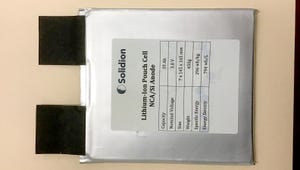Ford, UAW Reach Tentative Contract Agreement
Ford Motor Co. and United Auto Workers have acknowledged reaching a tentative labor agreement, subject to rank-and-file approval as early as Sunday. So far, no mention of battery plant representation.

The United Auto Workers and Ford Motor Co. have reached a tentative labor agreement, each has acknowledged, bringing a possible end in sight to the UAW strike against Ford, General Motors, and Stellantis. The strike, which began on September 15 with a walkout at one plant from each automaker, extended since then to eventually bring more than 50,000 of the UAW's 146,000 members to the picket line.
The preliminary agreement with Ford reportedly includes a comprehensive 25 percent wage increase, as communicated to the union. The agreement was reached shortly before the automaker's release of its third-quarter earnings report on Thursday. It is subject to approval by Ford’s UAW-represented employees.
Union demands have encompassed a wage hike, the cessation of the two-tier wage system initiated during the Great Recession, enhancements to retirement benefits, and adjustments for the cost of living. Additionally, the UAW is advocating for a “just transition,” ensuring union wages are maintained as automakers ramp up electric vehicle (EV) production.
Deal details
"We are pleased to have reached a tentative agreement on a new labor contract with the UAW covering our U.S. operations," Ford said in a statement on Wednesday evening. In a video address by UAW President Shawn Fain and UAW Vice President Chuck Browning, the union leaders gave some details of the agreement.
The outlined gains in the agreement, as detailed by Fain and Browning, surpass the benefits of the 2019 contract by more than fourfold. It introduces substantial base wage increases, exceeding what Ford workers have received in the last 22 years. The deal encompasses a 25% increase in base wages until April 2028, resulting in an overall top wage surge of over 30% to surpass $40 per hour. Additionally, the starting wage experiences a remarkable 68% increase, reaching over $28 per hour.
The lowest-paid Ford workers will witness a raise exceeding 150% throughout the agreement's duration, with immediate ratification granting some workers an 85% increase. The agreement reinstates significant benefits lost during the Great Recession, including Cost-of-Living Allowances and a three-year Wage Progression. It eliminates divisive wage tiers within the union and enhances retirement benefits for current retirees, pensioned workers, and those with 401(k) plans. A groundbreaking inclusion is the historic right to strike over plant closures, marking a first for the union.
What about battery plants?
One goal of the UAW has not been mentioned in the celebratory descriptions of the Ford agreement, however: That of allowing the company’s future battery plants to be represented by the union.
That goal has been complicated by the fact that the battery plants are joint ventures with foreign battery makers—in Ford’s case, the technology for the lithium iron phosphate batteries—to be built at its BlueOval Battery Plant in Marshall, MI, where construction has been paused by Ford since September 26—is leased from China-based battery behemoth, CATL.
Throughout the strike, Ford has insisted that that particular UAW demand is “off the table.” However, on October 6, UAW president Shawn Fain announced what he called a “major breakthrough” in the union's contract negotiations with General Motors, saying that the automaker has agreed in writing to place workers who make the batteries that go into electric cars under the UAW's national master agreement.
In the immediate aftermath of announcing the new tentative agreement between Ford and UAW, both sides’ silence on the battery plant issue is a point of continuing interest.
About the Author(s)
You May Also Like





